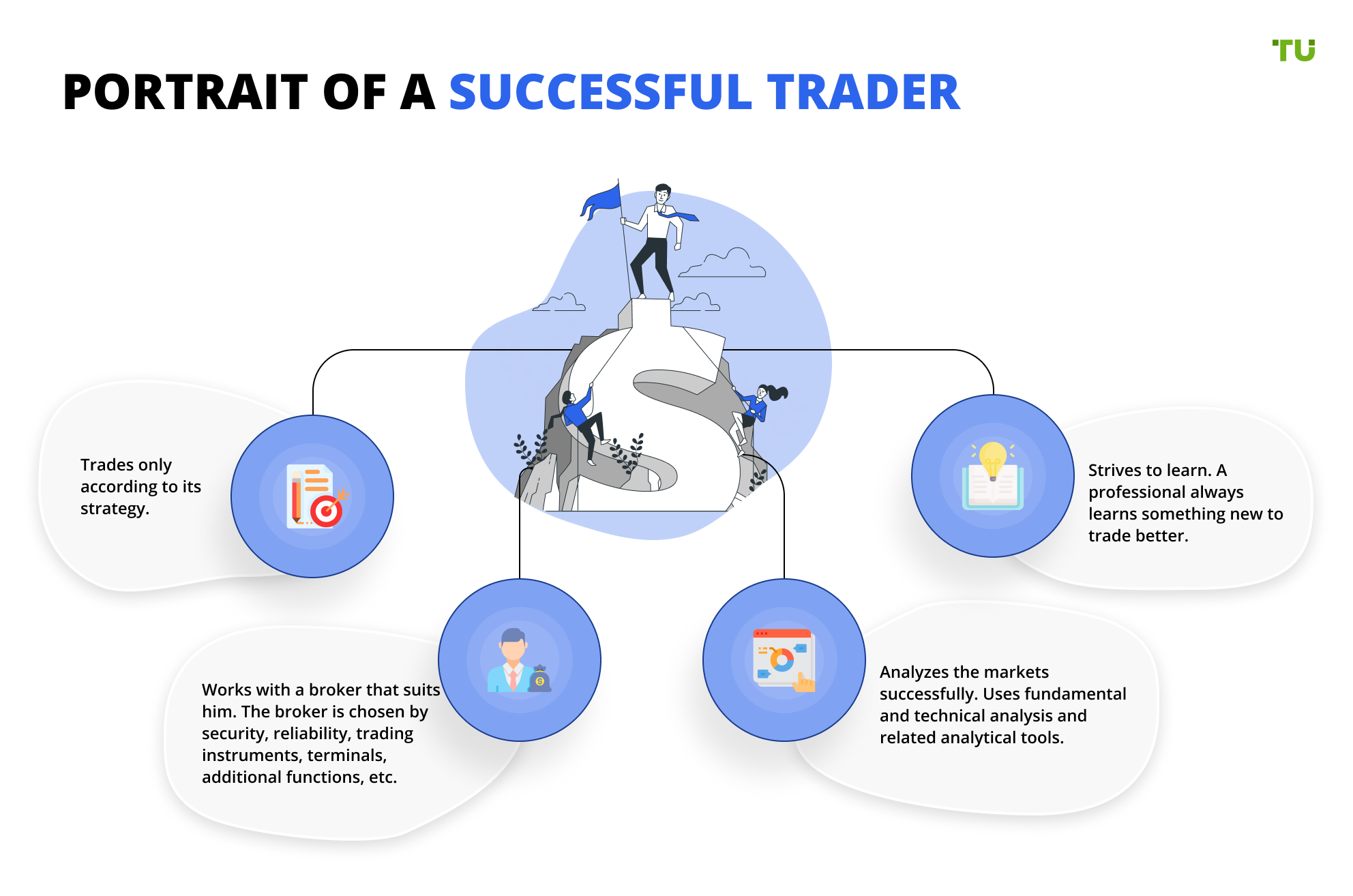How to become a successful Forex trader?
According to Traders Union’s experts the five essential Forex trading tips include:
-
1
developing and adhering to a well-defined trading strategy;
-
2
carefully selecting a suitable broker and trading platform;
-
3
understanding and applying the risk:reward ratio and expectancy;
-
4
recognizing and avoiding psychological biases;
-
5
documenting trading performance to facilitate learning and improvement.
Foreign exchange trading, also known as Forex trading, is a lucrative and dynamic industry that has gained tremendous popularity in recent years. With an average daily trading volume of over $6 trillion, Forex trading offers immense opportunities for individuals looking to enter the financial markets. However, success in Forex trading requires a combination of skills, knowledge, and discipline, and becoming a successful Forex trader takes time, effort, and dedication. So, in this article, the TU experts will explore some essential tips and strategies to help you become a successful Forex trader.
5 Forex trading tips
In this section, the experts have discussed five essential Forex trading tips, along with in-depth explanations and examples to help you enhance your trading performance.
1. Decide on a strategy and stick to its rules
Before embarking on your Forex trading journey, it's crucial to establish clear goals and determine a suitable trading style. Different trading styles have varying risk profiles, requiring specific attitudes and approaches. Assess whether you are more inclined towards day trading, position trading, swing trading, or another style. Aligning your trading style with your personality and risk tolerance will help prevent stress and losses.
Once you've identified a trading style that fits your personality, develop a solid trading strategy with specific rules for entering and exiting trades. Consistency in following your strategy is key to long-term success, as it helps you minimize impulsive decisions and manage risk effectively.
2. Choose your broker and platform appropriately
Selecting a reputable broker is vital, as it directly impacts your trading experience. Research the differences between brokers and consider aspects such as their policies, market-making approaches, fees, and customer support. Ensure that the broker is regulated by a reputable financial authority.
Additionally, make sure your broker's trading platform supports the type of analysis you want to perform. A user-friendly platform with a wide range of tools, indicators, and charting features will help streamline your trading process. Remember that a good broker with a poor platform or a good platform with a poor broker can both be problematic, so strive to find the perfect balance between the two.
3. Risk: Reward Ratio and Expectancy
Understanding the risk:reward ratio is essential for determining the level of risk you're willing to take on each trade and the potential profits. For example, if your potential loss per trade is $100 and your potential profit is $300, your risk:reward ratio would be 1:3. This means you could potentially earn three times the amount you risk on each trade.
Expectancy is a formula used to determine how reliable your trading system is. It takes into account your winning percentage, average win, and average loss. Here's an example with different numbers:
You made ten trades with six winners and four losers.
Your winning trades made a total of $1,800, so your average win is $300 ($1,800/6).
Your losing trades lost a total of $800, so your average loss is $200 ($800/4).
Expectancy = (% Won * Average Win) - (% Loss * Average Loss)
Expectancy = (0.60 * $300) - (0.40 * $200) = $100
So, based on this example, you could expect to earn $100 per trade on average.
4. Avoid psychological biases
Various psychological biases can impact your decision-making process in Forex trading. Recognizing and managing these biases can help you make better trading decisions and improve your overall performance. Some common biases include:
Confirmation bias: Seeking information that confirms your pre-existing beliefs while dismissing contradictory evidence.
Anchoring bias: Relying too heavily on the first piece of information encountered, which can influence subsequent decisions.
Overconfidence bias: Overestimating your skills and knowledge, leading to excessive risk-taking and poor decision-making.
Loss aversion: The tendency to prefer avoiding losses over acquiring equivalent gains, causing traders to hold on to losing positions for too long.
Regularly reviewing your trades and identifying the presence of these biases can help you refine your trading strategy and minimize their impact.
Trading psychology: how to achieve success5. Document your performance
Documenting your trades and performance is an excellent learning tool. By maintaining a trading journal that includes charts, reasons for each trade, and any emotions that influenced your decisions, you can analyze your trading behavior and identify areas for improvement. A trading journal allows you to track your progress, spot recurring patterns, and develop a deeper understanding of your trading habits.
When reviewing your journal, consider the following:
Entry and exit points: Were your trade entries and exits in line with your strategy?
Emotional influences: Did emotions such as fear, greed, or anxiety affect your trading decisions?
Trade outcomes: Analyze the outcome of each trade, including profits, losses, and expectancy.
Risk management: Did you adhere to your risk:reward ratio and position sizing rules?
The benefits of documenting your performance are numerous, including increased discipline, better decision-making, and the ability to adapt your trading strategy over time. By consistently reviewing and learning from your trading journal, you can refine your approach and work towards becoming a more successful Forex trader.
Learn also what a "Forex God" is and discover how to potentially achieve significant success and profitability in forex trading.
In conclusion, these five Forex trading tips provide a foundation for success in the currency market. By deciding on a suitable trading strategy, selecting an appropriate broker and platform, understanding risk:reward ratio and expectancy, avoiding psychological biases, and documenting your performance, you can increase your chances of long-term profitability and growth as a Forex trader. Always remember that trading success requires patience, discipline, and continuous learning.
What makes a Forex trader successful?

Portrait of a successful trader
1. Adherence to a strategy
Successful traders consistently follow their trading strategies, understanding that a disciplined approach yields better long-term results. They create a well-defined plan for each trade, specifying position size, entry point, stop-loss exit, and take-profit exit. They remain flexible with their take-profit targets, adjusting based on market conditions, but never compromise on their stop-loss orders. This adherence to their strategy helps them avoid impulsive decisions driven by emotions or market noise.
2. Selecting the right broker
A successful trader recognizes the importance of partnering with a reliable broker that suits their needs and priorities. They consider factors such as security, reliability, trading instruments, platforms, fees, and additional features when choosing a broker. This ensures that they have the tools and support necessary for successful trading.
For example, a trader focused on algorithmic trading would prioritize a broker that offers a robust trading platform with advanced charting tools and compatibility with popular programming languages for automated trading.
3. Commitment to learning
Professional traders understand that the markets are constantly changing and that continuous learning is essential for success. They invest time and effort in expanding their knowledge by studying new techniques, attending webinars, reading articles, and participating in trading communities. This commitment to learning helps them stay ahead of the curve and adapt to evolving market conditions.
For example, a successful trader might set aside time each week to explore different trading strategies, analyze market trends, and deepen their understanding of market psychology.
4. Effective market analysis
Successful traders utilize a combination of fundamental and technical analysis to make informed trading decisions. They leverage various analytical tools, such as economic indicators, advanced chart patterns, and technical indicators, to evaluate market conditions and identify potential opportunities. By staying updated on relevant market news and events, they can better anticipate price movements and manage their trades accordingly.
For example, a trader might analyze the impact of an upcoming central bank interest rate decision on a currency pair, considering the potential market reactions to different outcomes and devising a trading plan based on their analysis.
Other key practices of successful Forex traders:
1. Anticipate Different Outcomes
Like chess players, successful Forex traders think several moves ahead, considering possible market reactions to future events. They analyze various scenarios, constructing trading strategies around these potential outcomes. This forward-thinking approach allows them to act quickly and decisively when market conditions change, capitalizing on opportunities and managing risks effectively.
2. Stay Flexible
Top traders understand the importance of adaptability and resist getting emotionally attached to positions. They prioritize profit-making and loss minimization over being right or wrong. They closely monitor incoming news and information, quickly adjusting their positions if events run counter to their expectations. By staying flexible, they can capitalize on new opportunities and minimize losses.
For example, a trader might quickly exit a long position if a sudden news event causes a sharp reversal in the market, or they might even consider entering a short position to take advantage of the new trend.
3. Be Prepared
Successful traders stay informed about upcoming economic data releases, scheduled speakers, central bank meetings, financial gatherings, and liquidity conditions. They also use rate alerts to monitor price movements and assess potential trading opportunities. By staying well-prepared, they can anticipate market developments and make more informed trading decisions.
For example, a professional trader might create a calendar of upcoming events, such as central bank meetings or major economic data releases, and set up alerts for significant price movements in their chosen currency pairs.
4. Identify the Market Environment
Skilled traders can assess whether the market is trending or range-bound and adjust their strategies accordingly. If the market is trending, they aim to trade in the direction of the trend, looking for entry points that align with the overall momentum. Conversely, if the market is range-bound, they adopt a contrarian approach, buying near the bottom and selling near the top of the range. They also define an ultimate breaking point for the range, and if that point is hit, they adapt their strategy without hesitation.
For example, in a trending market, a trader might use a trend-following strategy such as a moving average crossover system. In a range-bound market, they could employ a mean reversion strategy, trading around support and resistance levels.
5. Keep Up to Date with Technicals
Even if they do not primarily use technical analysis, successful traders stay informed about important technical levels in the currency pairs they trade. They monitor key Fibonacci retracement levels, moving averages, trend lines, and major recent highs and lows to identify potential turning points and support or resistance areas.
6. Focus and Specialization
Many successful traders concentrate on a limited number of currency pairs, allowing them to gain a deeper understanding of the price behavior and characteristics of those pairs. This specialization helps them fine-tune their trading strategies, adapt to the unique aspects of each pair, and streamline the information they need to monitor.
7. Protect Your Profits
Profitable traders actively manage their winning positions, taking profits and minimizing losses at strategic points. They employ tactics such as partial take-profits, modifying stop orders, or closing positions entirely after a favorable market move. The primary goal is to preserve gains and avoid risking profits to chase slightly higher returns.
8. Use Stop Losses and Risk Management
All traders experience losses, but successful ones actively manage their risk exposure and protect their profits. Using stop-loss orders is crucial to prevent a losing trade from severely impacting their account balance. Additionally, they risk only a small percentage of their capital on each trade, allowing them to withstand a series of losses and take advantage of opportunities in the long run.
5 best Forex trading quotes
In the world of Forex trading, wisdom and inspiration can be found not only in books and courses but also through the insights and experiences of successful traders. Throughout history, renowned market experts have shared their knowledge, often encapsulating complex ideas in concise and memorable quotes. These quotes can serve as powerful reminders and guiding principles for both beginners and experienced traders alike.
“The goal of a successful trader is to make the best trades. Money is secondary.” - Alexander Elder
This quote emphasizes the importance of focusing on the quality of your trades rather than simply chasing profits. By concentrating on making the best decisions, financial success will naturally follow.
“If most traders would learn to sit on their hands 50 percent of the time, they would make a lot more money.” - Bill Lipschutz
Patience is key in trading. This quote suggests that traders should avoid overtrading and wait for the right opportunities, as acting impulsively can often lead to losses.
“Don’t worry about what the markets are going to do, worry about what you are going to do in response to the markets.” - Michael Carr
This quote highlights the importance of focusing on your own actions and strategies in response to market movements, rather than attempting to predict the unpredictable.
“It’s not whether you’re right or wrong that’s important, it’s how much money you make when you’re right and how much you lose when you’re wrong.” - George Soros
This quote reminds traders that success isn't determined by the number of correct predictions, but by effectively managing profits and losses to maximize overall gains.
“Risk comes from not knowing what you’re doing.” – Warren Buffett
Knowledge and understanding are essential for minimizing risk in trading. This quote emphasizes the importance of educating oneself and gaining experience to make informed decisions in the Forex market.
Richest Forex Traders in the World - What Are Their Secrets?Forex scams: How to avoid them?
Forex trading scams can wreak havoc on investors, often luring them with promises of high returns, only to leave them empty-handed. To safeguard yourself, it's crucial to recognize common scams and understand how to sidestep them. In this section, we'll explore various Forex scams and offer advice on recognizing and avoiding them.
Navigating signal seller scams
Signal sellers supply recommendations on optimal times to purchase and sell currencies based on their market analysis. However, scammers may charge investors without providing any guidance or supplying fraudulent trade information. To dodge such scams, be wary of companies assuring guaranteed successful trades and substantial profits.
Recognizing Forex robot scams
Forex robots are software applications that automatically execute currency purchases and sales using algorithms. Scammers might sell unverified or counterfeit software that makes random trades, resulting in investor losses. Always investigate the software and seek independent evaluations to prevent falling prey to these scams.
Avoiding Forex broker scams
Fraudsters may masquerade as legitimate Forex brokers or investment platforms, duping people into investing in non-existent funds. Always consult the FCA register and use only the listed contact details to confirm a broker's legitimacy.
Identifying Forex pyramid schemes
These schemes involve enlisting new members into investment groups that allege to offer advice and data for profitable Forex trading. Money is generated from membership fees instead of actual Forex trading profits. Exercise caution with schemes that emphasize recruiting more members and imposing subscription fees.
Detecting managed Forex account scams
Managed Forex accounts involve professional traders investing on your behalf, typically in exchange for a fee or commission. Scammers may feign to offer expert Forex trading services while stealing investors' funds. Always scrutinize financial services or platforms and verify the FCA register before committing your money.
Uncovering Forex Ponzi schemes
These schemes advertise non-existent Forex funds that promise substantial returns in a brief period. Initial investors might receive promised returns to create a false sense of success, after which the scammers vanish with the funds. Exercise caution with offers that appear too good to be true and require minimal initial investments.
Tips for Identifying Forex Scams:
Be cautious of unsolicited proposals and improbable returns.
Beware of time-sensitive offers and social media ads.
Dedicate time to researching and weighing the pros and cons of any investment opportunity.
Search for customer reviews on trustworthy websites and examine any pending legal actions against the broker.
Steer clear of opportunities that seem implausible.
Consult a licensed financial advisor if necessary.
By adhering to these guidelines, you can minimize your risk of falling victim to Forex scams and ensure a more secure trading experience.
Can I trade Forex with less capital?
When embarking on Forex trading, capital is necessary. Although large investments aren't always needed, insufficient funds can heighten risks. Limited capital is vulnerable to unexpected market movements, particularly during economic announcements.
Several factors determine the capital needed for trading, including:
Broker selection
Account type
Leverage
Lot size
Trading approach
Various brokers provide diverse trading platforms, each with its terms and conditions. Some brokers accept investments as low as $5, but it's crucial to ensure the security of your investment. Use the broker's minimum capital only to open an account and aim for a more substantial amount to minimize margin call risks.
The type of account significantly impacts the necessary capital. For example, micro accounts require smaller lot values and a minimum capital of around $5. However, at least $50 is suggested for comfortable trading. Standard accounts demand a higher initial deposit, typically about $500, but having at least $1,000 in your account is a safer choice.
Leverage allows traders to open positions worth more than their account balance by borrowing funds from their broker. The higher the leverage, the more positions or trades you can open with less capital. Leverage varies among brokers and accounts, with some offering ratios as high as 1000:1.
Your chosen trading strategy also influences the required capital. Scalpers, for instance, may need a minimum of $10,000 for more significant lot volumes and better returns. Long-term traders, on the other hand, should aim for at least $20,000 to maintain trades over longer durations.
However, if you still wish to begin, one way in which you can trade Forex with less capital is Forex bonuses. These deposit bonuses come in several forms, which vary among trading platforms. Understanding each type and reviewing the bonus terms and conditions for different brokers is crucial. Here are the most common Forex deposit bonuses:
Welcome Forex deposit bonus: This bonus is for new users on a broker's platform. It often provides the highest bonus rates, which expire once you start trading. In essence, the more you deposit initially, the higher your bonus will be.
Regular Forex deposit bonus: Unlike the welcome bonus, this bonus is awarded every time you deposit funds into your account. Although the bonus amount is usually capped at 50%, it can still augment your trading budget.
No deposit Forex bonus: This bonus is for new users who don't need to deposit funds to claim it. Instead, it represents a fixed sum, typically ranging from $10 to $250, and is awarded regardless of your initial investment.
Summary
In summary, the five essential Forex trading tips include: 1) developing and adhering to a well-defined trading strategy, 2) carefully selecting a suitable broker and trading platform, 3) understanding and applying the risk:reward ratio and expectancy, 4) recognizing and avoiding psychological biases, and 5) documenting trading performance to facilitate learning and improvement. By implementing these tips, traders can increase their chances of success and long-term profitability in the Forex market. Keep in mind that continuous learning, discipline, and patience are vital components of a successful trading journey.
FAQ
What is the best way to succeed in Forex trading?
To succeed in Forex trading, develop a well-defined strategy, choose a reliable broker, continuously learn, manage risk effectively, and maintain discipline.
What is the 5 3 1 rule in Forex?
The 5 3 1 rule stands for trading five currency pairs, mastering three strategies, and trading consistently at the same time every day to improve focus and expertise.
Is there a 100% winning strategy in Forex?
No, there is no 100% winning strategy in Forex, as markets are unpredictable. Focus on risk management and consistent long-term profits instead.
How can I win more Forex?
To improve Forex success, adhere to your strategy, manage risk effectively, avoid emotional decisions, continuously learn, and analyze your trading performance.











